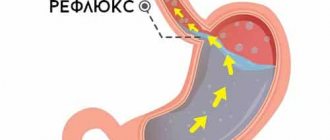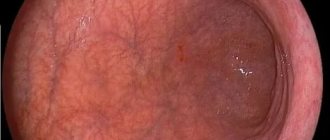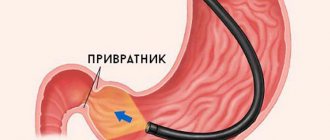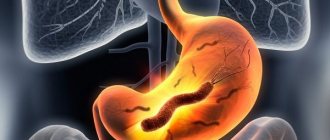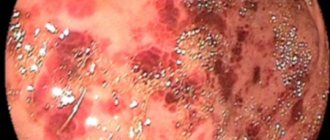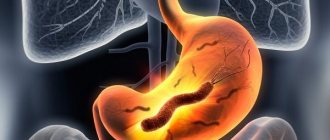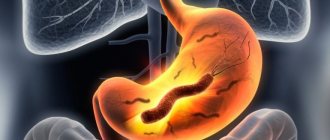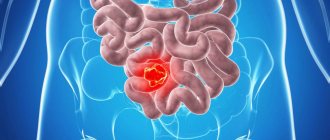Pathogenesis
The pathogenesis is based on a long-term inflammatory process in the gastric mucosa, which leads to its gradual structural restructuring. Long-term inflammation is triggered in response to a number of factors, both internal and external.
The inflammatory process develops as a round cell infiltration of neutrophils and other cells of the gastric mucosa involved in its immune system . Against the background of a long process and subsequent structural restructuring, dysregenerative processes are formed, which leads to dystrophy and atrophy . Gastric dysfunction is manifested by either hypo- or achlorhydria and gastric achylia .
Helicobacter pylori infection occupies an important place in the formation of the inflammatory process. The Correa cascade is well demonstrated by changes in the mucosa under the negative influence of H. pylori.
Possible complications of gastritis
The list of possible complications arising from gastritis is quite extensive. And even though gastritis itself is considered a “mild” pathology, if left untreated it can lead to the formation of fatal diseases.
- The erosive form can cause internal bleeding.
- Inflammation of the abdominal cavity (peritonitis) and blood poisoning (sepsis) can occur as a result of the formation of a phlegmonous form of the disease.
- Malignant neoplasms of the stomach can form as a result of atrophic gastritis.
- Since inflammation of the mucous membrane disrupts normal functioning, not only motor-evacuation functions are disrupted. It is possible to develop disturbances in absorption processes, which manifests itself as a deficiency of B vitamins, and in particular vitamin B12.
- The presence of an inflammatory process in the stomach can become a provoking factor in the development of inflammation in other organs of the gastrointestinal tract. Pancreatitis or cholecystitis often develops against the background of gastritis.
- Prolonged vomiting, which characterizes the acute stage, can lead to disturbances in the water-salt balance and cause dehydration.
- Decreased appetite can cause the development of nutritional deficiencies, leading to anorexia.
- Stomach ulcer.
Classification
According to the form of the disease, the disease is classified into:
- Acute superficial gastritis.
- Chronic superficial gastritis . In the absence of timely adequate therapy, the chronic form can turn into atrophic, which is characterized by a high risk of malignancy (transition to oncological forms).
At the location of the inflammatory process:
- the pathological process is localized in the outlet part of the stomach (antrum), which is why it got its name - antral gastritis ;
- damage to the body of the stomach;
- damage to the working day of the body of the stomach - fundic;
- damage to all parts of the stomach - pangastritis .
By scale they distinguish:
- Diffuse superficial gastritis . The diffuse type is characterized by the spread of the inflammatory process throughout the mucous membrane of the organ.
- Focal superficial gastritis . The focal form is characterized by damage to only certain areas of the stomach.
Classification by reason of occurrence:
- Dosage form . Develops as a side effect in response to taking certain medications.
- Endogenous form . It occurs in response to the influence of several internal factors at once.
- Bacterial form . It is formed as a result of the entry into the body of a bacterium such as Helicobacter pylori. According to statistics, in 85% of cases it is this microorganism that causes the development of gastritis.
- Reflux gastritis . It develops in response to the entry of highly acidic and bile from the duodenum into the stomach. This form is considered the most dangerous, because characterized by gradual metaplasia - the transition of cells into a foreign form, and the further development of the oncological process.
Classification by acidity level:
- with normal secretion;
- with increased secretion (hyperacid);
- with reduced secretion (hypoacid).
Traditional medicine tips
Additionally, traditional medicine advice is used as maintenance therapy. A number of recipes for stomach preparations have been described that have proven effective in the fight against diseases of the digestive system.
Only a doctor has the right to prescribe treatment. Certain types of gastritis cannot be cured solely by a healthy lifestyle and folk remedies. For example, if gastritis is caused by the bacterium Helicobacter pylori, relief will occur after the use of antibacterial therapy.
Based on this, it is recommended to use gastric preparations only after consulting a doctor. The prescribed treatment may be supplemented by the use of:
- An infusion based on a mixture of centaury, peppermint and St. John's wort in a 2:2:1 ratio.
- An infusion of equal parts of St. John's wort, plantain, and blueberry leaves.
- Rosehip decoction.
- Infusion of plantain leaves and white cabbage juice for gastritis of low acidity.
- An infusion of chamomile and yarrow flowers, leaves and stems of wormwood, mint, sage leaves, mixed in equal parts.
- Propolis tinctures.
- Infusion of pine buds or cedar cones.
- Sea buckthorn berry tea.
You can prepare the preparations yourself or purchase them ready-made at the pharmacy. The use of folk remedies should be agreed with your doctor. You should also be careful: too frequent use leads to allergic reactions. After diet therapy, many gastroenterologists prescribe sanatorium treatment.
Causes
Superficial gastritis develops as a result of prolonged exposure to several negative factors that damage the gastric mucosa.
Main causes of gastritis:
- consumption of alcohol-containing products;
- smoking, nicotine and cigarette tar entering the body;
- taking medications such as NSAIDs, sulfonamides, salicylates;
- non-compliance with the diet, consumption of smoked, salty, fatty foods; excessive presence of fast food in the diet; dry food; binge eating;
- consumption of low-quality, expired products;
- poor chewing of food;
- frequent drinking of coffee on an empty stomach;
- too long breaks between meals;
- excessive salt intake;
- work in hazardous industries (inhalation of lead, microparticles of coal dust);
- love of highly carbonated drinks;
- frequent stress;
- hormonal instability;
- infection with H. pylori from another person;
- ingestion of various acids and alkalis into the stomach.
Reasons that provoke the development of a moderate form of superficial gastritis:
- malfunctions of the immune system;
- hereditary predisposition;
- untreated acute gastritis;
- the presence of infectious diseases that occur in severe form;
- dysfunctional disorder in the work of the sphincter muscle between the stomach and duodenum;
- atherosclerosis , vasculitis and other pathological conditions that disrupt the normal blood circulation of the stomach;
- food poisoning;
- diseases of the renal system;
- pathology of lung tissue, heart;
- anemia;
- rheumatism;
- gout , diabetes mellitus and other endocrine disorders;
- helminthic infestations;
- infection with the causative agent of salmonellosis , dysentery and rotavirus infection .
How to treat the disease
Treatment of this pathology should be comprehensive: drug treatment is combined with diet.
In the early stages of focal superficial gastritis, the patient should normalize his lifestyle: stop drinking alcohol, get rid of the smoking habit, and eliminate unhealthy foods from the diet.
When the cause of gastritis is prolonged use of medications, you should stop taking these drugs or replace them with similar ones that are gentle on the gastric mucosa. In addition, it is advised to avoid stressful situations, get more rest, and allow feasible physical activity to maintain gastric motility.
When the disease is caused by the presence of Helicobacter pylori in the body, the patient must be prescribed Metronidazole and Omeprazole along with antibiotics.
To restore the structure of the gastric mucosa, use Solcoseryl and Actovegil.
When the cause of the pathology is duodenogastric reflux, it is necessary to take medications that prevent the contents of the duodenum from refluxing into the stomach.
To get rid of the feeling of nausea and dyspepsia, take: “Pancreatin”, “Mezim Forte”, “Almagel”, “Metoclopramide” and similar enzymatic agents;
Antispasmodics (“No-shpa”, “Metacin”, “Papaverine”, “Platifillin”) are used when pain attacks occur.
To increase the body's defenses, the doctor prescribes a course of multivitamin complexes, which should be selected strictly individually.
Diet for focal superficial gastritis
An important element in the treatment of focal superficial gastritis is diet, since the cause of the pathology is often poor nutrition.
If signs of focal superficial gastritis appear, it is recommended to avoid consuming the following products:
- smoked, pickled, salted products;
- semi-finished products;
- sausages;
- fried foods;
- strong coffee and tea;
- hot seasonings, various sauces;
- some types of vegetables: cabbage, onions;
- legumes
The diet of patients with a similar diagnosis should include only dried bread; fresh baked goods made from puff pastry or butter dough are prohibited.
The following principles of proper nutrition should be adopted:
- eat often and in small portions;
- first courses should be present in the diet;
- stop eating harmful foods;
- the intervals between meals should not be long;
- it is preferable to consume liquid, puree and porridge-like dishes;
- Eating should take place in a calm environment, food should be chewed thoroughly;
- dishes must be prepared by boiling or steaming;
- The last meal should be at least 4 hours before bedtime.
Exacerbation of gastritis requires special nutrition - diet “Table No. 1b” for 5-10 days. After which, diet No. 1 is followed for six months.
Permitted products include:
- lean types of fish, meat (veal, rabbit) and poultry (turkey, chicken);
- milk and fermented milk products (kefir, cottage cheese, soft cheeses, sour cream);
- bread, but only dried, crackers, dry cookies;
- steam omelette, soft-boiled eggs;
- pureed porridges made from oatmeal, semolina, and rice;
- vegetables;
- soups based on pureed vegetables, cereals, dairy;
- bananas, baked apples without peel, other fruits and berries in the form of mousses, compotes, purees, jellies, jams, preserves;
- marshmallow, honey, marshmallow.
Treatment of the disease with folk remedies
In addition to drug therapy and diet, traditional medicine recipes are used as supportive treatment.
Among the recipes used for this type of pathology, the following are famous:
- rosehip decoction;
- infusion based on a mixture of peppermint, centaury and St. John's wort in a ratio of 2:2:1;
- infusion of blueberry leaves, plantain, St. John's wort, which are taken in equal proportions;
- infusion based on pine cones or pine buds;
- infusion of white cabbage juice and plantain leaves. It is used for gastritis with low acidity;
- infusion of sage leaves, mint, chamomile and yarrow flowers, wormwood, which are taken in equal proportions;
- propolis tincture;
- sea buckthorn berry tea.
In addition to these folk recipes, the following are recommended:
- Infusion of flax seeds. To prepare it, 3 tbsp. spoons of seeds are poured with hot water (1 liter) and left to infuse overnight. The decoction is filtered in the morning and consumed before meals three times a day.
- Flaxseed oil. It is consumed 2 times a day, a tenth of a tablespoon.
- Potato juice. It is best prepared from pink tubers. 1 large tuber is grated on a fine grater and the mass is squeezed out. You should get 1 glass of juice, which should be consumed half an hour before meals.
- Propolis. This product is prepared in this way: a piece of propolis is placed in the freezer for 20 minutes, after which it is crushed. 30 g of crushed propolis is poured with hot water (100 ml), simmered over low heat for about an hour, stirring all the time. Strain the resulting broth through cheesecloth. Store this product in a dark container at room temperature for no more than a week. This propolis remedy is taken twice a day, 100-150 ml. The course of treatment is about 2 weeks.
- Burdock root. To treat with this plant, no preliminary preparation is required. Burdock root is simply washed with running water and consumed fresh for a whole month, 4-5 roots at a time. In addition, you can use another method of application: 1 teaspoon of crushed burdock root is poured with boiling water and left to infuse overnight. In the morning, the mixture is filtered and drunk three times a day, a quarter of an hour before meals, 1 third of a glass.
Symptoms of superficial gastritis
Superficial gastritis can manifest itself symptomatically only during certain periods, as a result of the influence of negative factors on the gastric mucosa.
Main symptoms of the disease:
- a feeling of heaviness in the epigastric region immediately or some time after eating;
- a feeling of compression, burning in the stomach, a feeling of fullness in the abdomen;
- in addition to the feeling of hunger, patients note mild nausea;
- aching, dull pain in the stomach area that occurs immediately after eating, as well as at night;
- the appearance of heartburn after eating “heavy”, fatty foods and consuming alcohol-containing products;
- belching with sour contents;
- noticeable pallor of the skin;
- pain on palpation in the stomach area;
- stool disorders, diarrhea ;
- the appearance of bad breath;
- decreased appetite.
Patients also complain of severe pain in the epigastric region, which occurs in response to eating spicy or too hot food. Most often, this indicates involvement of the duodenum in the inflammatory process.
Below are symptoms indicating the transition of superficial gastritis to an atrophic form:
- refusal to eat, poor appetite;
- noticeable weight loss;
- diarrhea syndrome;
- the appearance of a white coating on the root of the tongue;
- frequent belching of air, mainly in the morning;
- constant nausea;
- vomit;
- severe weakness throughout the body.
Mixed superficial and hyperplastic gastritis with glandular hypertrophy
Hyperplastic gastritis is a special type of lesion of the gastric mucosa, with intense proliferation of epithelial cells. Characterized by the formation of polyps and thick rigid folds, mucosal hyperplasia. The pathology does not appear for a long time.
In advanced cases, symptoms appear:
- vomit;
- diarrhea;
- minor bleeding.
Often the disease occurs with increased secretory function, but unlike hyperacid gastritis, this condition is not based on an inflammatory reaction, but on hypertrophy of the gastric glands.
The etiology of the disease has not been sufficiently studied, so treatment is symptomatic: in case of increased acidity, antisecretory drugs are prescribed, and in case of atrophy, replacement therapy is prescribed. If malignancy is suspected, surgical treatment is indicated.
Tests and diagnostics
If the symptoms described above appear, it is recommended to immediately consult a specialist to carry out diagnostic measures and identify the true cause of poor health.
Basic diagnostic methods:
- Blood test: general and biochemical . Allows you to assess the functional state of internal organs.
- Coprogram . Stool is collected to identify bloody inclusions and signs of internal bleeding .
- X-ray examination of the stomach with a contrast agent . Allows you to identify ulcerative defects , hernias and neoplasms.
- Collection of gastric juice . In dynamics, the study allows you to evaluate secretory activity.
- Fibrogastroduodenoscopy . Thanks to a comprehensive research method, it is possible to assess the condition of the mucous membrane of not only the stomach, but also the duodenum.
- Study of a biopsy of the gastric mucosa. It is possible to identify H. pylori and exclude/confirm cancer.
Treatment
Gastroduodenoendoscopy remains the main method for diagnosing superficial gastritis today. True, in recent years this unpleasant procedure has begun to cause patients much less discomfort, since the equipment with which it is performed has undergone significant changes. With the help of gastroduodenoendoscopy, it is possible to establish an accurate diagnosis, determine what type of gastritis the patient suffers from, whether he has a stomach ulcer or, for example, oncology.
What are the features of the treatment of superficial gastritis?
The mild form of this disease does not require medications. It is quite enough to eliminate the provoking factor, stop drinking alcohol, not smoke, and stay on a gentle diet for a week or two. Unfortunately, having learned about such a “frivolous” diagnosis, many prefer to dismiss it as not worthy of special attention, for which they subsequently pay with a deterioration in their health. The disease becomes chronic, the destruction of the deeper layers of the stomach lining begins, and there it is not far from the death of the mucous membrane and the appearance of malignant neoplasms.
Recently, doctors have discovered a relationship between the manifestations of chronic gastritis and the activity of Helicobacter pylori bacteria, which can be found in the stomach of almost every person. If you are diagnosed with these bacteria, you will have to undergo a course of treatment with antibiotics and medications that reduce the acidity of gastric juice: for example, metronidazole with clarithromycin or amoxicillin with clarithromycin.
Drugs such as Ranitidine or Omeprazole will help reduce the acidity of gastric juice. In addition to their main purpose, they help reduce pain and protect the gastric mucosa from further destruction.
Prevention
General preventive measures that will help not only avoid the development of superficial gastritis, but also increase the period of remission in patients with an already established diagnosis:
- Changing your lifestyle (observing work, sleep and rest schedules), giving up bad habits.
- If negative symptoms appear, do not self-medicate and consult a specialist in a timely manner. If necessary, issue a sick leave certificate.
- Avoid stressful situations, strive to develop stress resistance.
- Try to eat foods whose temperature is approximately +37 degrees. Products above +60 degrees and below +15 degrees are prohibited.
- Try to consume foods in liquid and crushed form. Preference is given to porridge-like foods and purees.
- Food should be taken 6-8 times a day, and long periods of fasting should not be allowed, after which there is a high risk of overeating.
- The last meal is 2 hours before going to bed.
- The amount of food consumed per day should not exceed 3 kg (30% for breakfast, 15% for second breakfast, 40% for lunch and 15% for dinner).
Treatment with folk remedies
Methods of folk treatment and herbal therapy always show a positive, effective effect. Prevention and treatment of superficial gastritis in this regard are no exception.
Important! Useful information about treating gastritis with folk remedies at home can be found on our website.
Burdock
The roots of common burdock will quickly help to cope with this disease.
Burdock root decoction:
- Pour 400 milliliters of boiling water over a teaspoon of crushed raw materials.
- Leave in a warm place for 12 hours.
- Filter and squeeze the roots thoroughly.
- Take 2-3 times a day, 100 milliliters at a time.
Potato
Doctors advise taking fresh potato juice internally - you need 300 milliliters per day for a positive result.
Sea buckthorn
Sea buckthorn or sea buckthorn oil is the best medicine for superficial gastritis.
You can prepare sea buckthorn tea:
- Take ripe sea buckthorn fruits in the amount of 3 tablespoons.
- Pour 0.5 liter of boiled water.
- Let it brew for half an hour.
- Boil over low heat for 10 minutes.
- Strain and add a little honey.
- Drink one cup as tea three times a day.
Note! Sea buckthorn oil can be added to food daily, a few drops. This remedy has a positive effect on the regenerative function of the main digestive organ.
St. John's wort
The herb St. John's wort has an anti-inflammatory effect.
St. John's wort infusion:
- Pour a tablespoon of dried raw material into a glass of boiled water.
- Leave in a dark place for 2 hours to infuse.
- Be sure to wrap the infusion warmly - you can place it in a thermos.
- Strain.
- Take a third of a glass twice a day.
Infusion of yarrow and buckthorn
To prepare the product, you need to take one teaspoon of these herbs. Pour two liters of boiled water over them. Boil over low heat for ten minutes, leave in a thermos for 5 hours. Drink half a glass before bed for a week.
Propolis
To reduce pain and activate the process of restoration of the stomach walls, you can eat 8 grams of propolis crushed to a powder form every morning on an empty stomach.
- It is recommended to drink fresh carrot juice for 10 days in a row.
- You can also drink calendula tea, but not more than a liter per day.
Chicory root infusion
You can make a drink from chicory root.
- Pour 2 tablespoons of raw material into 500 milliliters of pre-boiled water.
- Boil over medium heat for 20 minutes.
- Let it brew for 3 hours.
- Filter, put in the refrigerator.
- Consume half an hour before meals three times a day.
Note! These recipes are intended specifically for the treatment of superficial gastritis. Their use for other types of disease may not bring the desired effect.
Diet for superficial gastritis
Diet for superficial gastritis of the stomach
- Efficacy: therapeutic effect after 10 days
- Duration: a month or more
- Cost of products: 1500-1600 rubles. in Week
Patients suffering from chronic superficial gastritis are recommended to follow a special gentle diet, which completely excludes the consumption of dishes and products that have a negative, irritating effect on the gastric mucosa (soda, fast food, smoked meats).
Preference in nutrition should be given to dishes made from lean meats. Cereals should be consumed only in boiled form, vegetables must undergo mandatory heat treatment. Soft-boiled eggs, non-acidic kefir, low-fat pureed cottage cheese, milk, jelly and herbal teas are allowed for consumption.
Consequences and complications
The early form of the disease is antral superficial gastritis. In the absence of adequate treatment, non-compliance with diet therapy and refusal to lead a healthy lifestyle, certain complications may develop:
- formation of pangastritis , in which the inflammatory process spreads to all parts of the stomach;
- involvement of the duodenum in the pathological process, erosive lesions, bulbitis , acute gastroduodenitis ; in advanced cases, a non-scarring open ulcerative defect is diagnosed;
- development of reflux with the reflux of contents from the duodenum into the stomach, and from the stomach into the esophagus;
- development of colitis , adhesive disease ;
- bleeding from ulcerative defects and erosions.
Mechanism of disease development
The occurrence of superficial gastritis can be affected by pathologies of other organs. Thus, chronic heart failure and impaired blood circulation lead to a decrease in the protective function of the gastric walls and a decrease in the production of digestive juices. This promotes the rapid proliferation of pathogenic bacteria, which cause inflammation of the stomach wall.
Kidney failure can lead to damage to the gastric mucosa, swelling and erosion. Bile reflux (reverse outflow) also damages the gastric mucosa as a result of repeated secretion of pepsin. In addition, the occurrence of superficial gastritis can be caused by taking certain medications, namely antipyretics, antibiotics and analgesics. Taking them leads to a decrease in blood flow in the walls of the stomach, resulting in inflammation.
